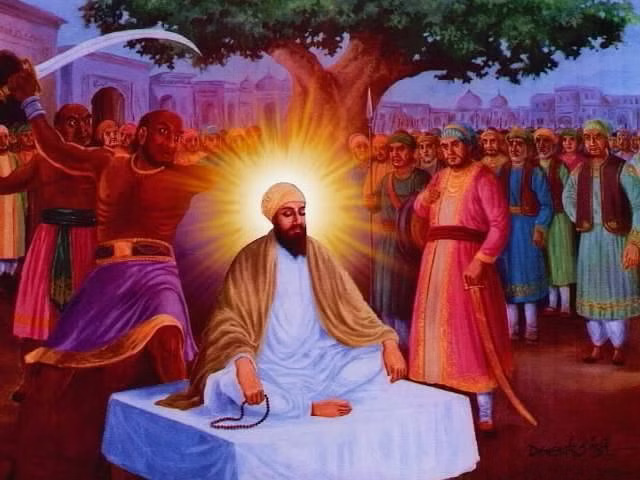Title: Sri Guru Teg Bahadur Sahib Ji: The Ninth Guru of Sikhism and Martyr of Religious Freedom..
Sri Guru Teg Bahadur Sahib Ji, also known as Guru Tegh Bahadur, was the ninth of the ten Sikh Gurus who played a significant role in shaping Sikhism. He was born on April 1, 1621, in Amritsar, Punjab, India. Guru Teg Bahadur Ji’s life was characterized by his selfless service, commitment to justice, and ultimate sacrifice in defense of religious freedom. This article explores the life, teachings, and martyrdom of Guru Teg Bahadur Ji, highlighting his profound impact on Sikhism and his legacy that continues to inspire millions.
Early Life and Spiritual Journey:
Guru Teg Bahadur Ji was born to Guru Hargobind Sahib Ji, the sixth Guru of Sikhism. From a young age, he exhibited spiritual inclinations and displayed exceptional wisdom and compassion. He received an education that encompassed religious teachings, martial arts, and languages. Guru Teg Bahadur Ji was an accomplished poet, musician, and scholar, well-versed in the teachings of Sikhism.

Appointment as the Ninth Guru:
In 1664, Guru Teg Bahadur Ji was appointed as the ninth Guru of the Sikhs following the martyrdom of his father, Guru Hargobind Sahib Ji. He assumed the responsibility of guiding the Sikh community and upholding the values of Sikhism, which emphasized the principles of equality, justice, and devotion to God.
Champion of Religious Freedom:
One of Guru Teg Bahadur Ji’s most notable contributions was his unwavering commitment to religious freedom and protection of human rights. During his tenure as Guru, he encountered various challenges, including religious persecution of non-Muslims under the Mughal Empire. Guru Teg Bahadur Ji fearlessly stood against these injustices and actively advocated for the right to practice one’s religion freely.
The Martyrdom of Guru Teg Bahadur Ji:
In 1675, when Kashmiri Pandits approached Guru Teg Bahadur Ji seeking his intervention against religious persecution, he selflessly decided to confront the oppressive Mughal regime. The Guru, accompanied by a few disciples, traveled to Delhi to challenge Emperor Aurangzeb’s religious tyranny. Despite being offered wealth, power, and safety, Guru Teg Bahadur Ji chose to sacrifice his life rather than compromise his principles.
Guru Teg Bahadur Ji was arrested, subjected to severe torture, and ultimately beheaded in Delhi on November 11, 1675. His martyrdom served as a catalyst, awakening the Sikh community to the importance of defending religious freedom and standing up against oppression.
Legacy and Impact:
Guru Teg Bahadur Ji’s martyrdom left an indelible mark on Sikh history and its struggle for religious freedom. He became a symbol of sacrifice and courage, inspiring generations of Sikhs to uphold the principles of justice, equality, and compassion. Guru Teg Bahadur Ji’s teachings, captured in the sacred scripture Guru Granth Sahib, continue to guide millions of Sikhs worldwide.
The martyrdom of Guru Teg Bahadur Ji also played a pivotal role in the development of Sikh identity. It highlighted the significance of fighting for the rights of marginalized communities, irrespective of their religious beliefs. Today, Guru Teg Bahadur Ji’s legacy resonates beyond the Sikh community, inspiring individuals and communities to champion religious freedom and stand against all forms of religious persecution.
Sri Guru Teg Bahadur Sahib Ji’s life exemplified the core values of Sikhism, including selfless service, justice, and
devotion. His martyrdom in defense of religious freedom serves as a testament to his unwavering commitment to principles and has left an indelible impact on Sikh history and the broader struggle for human rights. Guru Teg Bahadur Ji’s teachings and sacrifice continue to guide and inspire millions, reminding us of the importance of standing up against oppression and upholding the principles of justice and equality in society.

